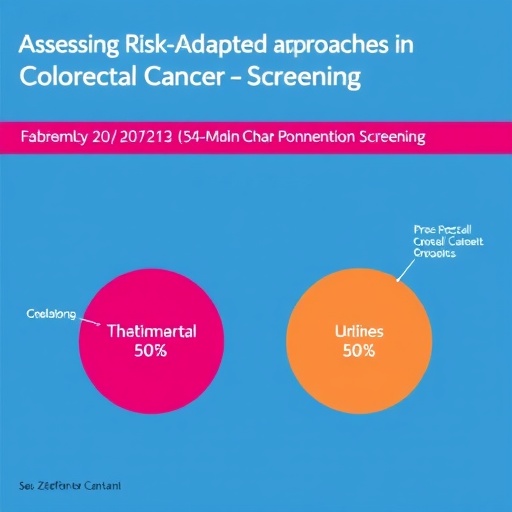In a groundbreaking study published in the journal “Military Medical Research,” researchers led by Chen HD. et al. have delved into the effectiveness and cost-effectiveness of risk-adapted colorectal cancer screening. This pivotal investigation goes beyond mere statistics, illustrating the critical importance of tailored screening processes in reducing the incidence and mortality associated with colorectal cancer (CRC). This form of cancer, which remains one of the leading causes of cancer-related death globally, necessitates innovative approaches to screening that can save lives and reduce healthcare costs.
The researchers set out to explore the potential benefits of risk-adapted screening, which aligns screening frequency and methodology with an individual’s specific risk factors. An initial analysis suggested that a one-size-fits-all approach to CRC screening might overlook at-risk populations while leading to unnecessary procedures for those at lower risk. This observation drives home the need for a more nuanced strategy, which could optimize healthcare resources while maximizing patient outcomes.
Through a randomized controlled trial involving diverse participants, this study meticulously assessed various screening methods, including colonoscopy, fecal immunochemical testing (FIT), and multi-target stool DNA tests. Participants were segmented based on their risk factors, including family history of CRC, genetic predisposition, and lifestyle factors such as diet and exercise. This segmentation allowed for a more focused and efficient screening strategy capable of enhancing early detection rates of CRC among high-risk individuals.
One of the significant findings of the study is that risk-adapted screening can lead to earlier detection of neoplastic polyps and cancer. Early diagnosis is pivotal as it dramatically increases survival rates and can reduce the need for more aggressive treatments later on. The research highlights that by identifying high-risk individuals and applying targeted screening protocols, healthcare systems can significantly decrease CRC mortality rates.
Moreover, the study also undertook a thorough cost-effectiveness analysis. By integrating clinical effectiveness data with economic evaluations, it becomes evident that risk-adapted screening is not just clinically beneficial but also economically advantageous. The findings imply that investing in personalized screening protocols could yield substantial savings for healthcare systems burdened by the rising costs of cancer management.
The implications of this research are profound. If adopted widely, risk-adapted screening could transform the landscape of colorectal cancer prevention. It underscores a shift towards personalized medicine, where treatment and preventive strategies are tailored to individual patient profiles rather than relying on general population averages. As such methodologies gain traction, they invite a re-evaluation of current guidelines that may not fully account for individual variances in risk.
In discussing the ethical ramifications, the researchers emphasize the importance of ensuring equitable access to these tailored screening programs. There must be a concerted effort to prevent disparities in healthcare access, ensuring that risk-adapted screening reaches all demographics, especially marginalized populations who are often at heightened risk yet lack access to adequate health resources.
Moreover, the research promotes further investigation into the psychological impacts of risk-adapted screening. Understanding how individuals perceive their risk and respond to screening notifications is crucial for fostering compliance and engagement with screening programs. Mental health considerations can affect outcomes, and future studies could explore how to enhance patient communication and education regarding their specific risks.
Continued research will also be pivotal in assessing the longevity and effectiveness of risk-adapted screening over time. Subsequent studies could investigate whether these screening strategies remain effective as patient demographics evolve or as new screening technologies emerge. This aligns with the broader goal of continually fine-tuning cancer prevention strategies to match the changing landscape of public health.
The study underscores the ongoing need for collaboration between researchers, healthcare providers, and policymakers to facilitate the implementation of risk-adapted CRC screening. Effective policies that support these innovations are necessary to ensure that advancements in cancer screening translate into real-world impact, ultimately leading to reduced CRC incidence and mortality.
In summary, the work of Chen HD., Lu B., Shi JF., and their colleagues is not just a contribution to scientific literature; it is a call to action. As they advocate for the adoption of risk-adapted screening protocols, they illuminate a path forward in the fight against one of the most prevalent cancers. Their findings pave the way for a future where early detection and personalized care become the standard, ultimately saving lives while conserving economic resources.
Given the growing emphasis on precision medicine and tailored healthcare interventions, this study will likely stir discussions at various levels within the medical community and beyond. Stakeholders from all sectors must collaborate to make risk-adapted screening a standard practice, ensuring that advancements in research translate into tangible public health outcomes. The opportunity to improve cancer detection rates and patient survival through more personalized strategies, as highlighted in this innovative work, cannot be underestimated.
By embracing these developments, society moves closer to a more systematic and effective approach to colorectal cancer screening, shifting the emphasis from reactive treatment to proactive prevention. This transformative research offers a glimmer of hope in combating a formidable disease, suggesting that smarter, data-driven strategies can redefine the standard of care in oncology.
Ultimately, this study serves as a reminder of the intersection of healthcare innovation and patient-centered care. Emphasizing the need for a holistic approach to cancer prevention, it showcases how targeted screening can lead to healthier populations and a more sustainable healthcare system.
Subject of Research: Risk-Adapted Colorectal Cancer Screening
Article Title: Effectiveness and cost-effectiveness of risk-adapted colorectal cancer screening: a randomized controlled trial and modeling analysis.
Article References:
Chen, HD., Lu, B., Shi, JF. et al. Effectiveness and cost-effectiveness of risk-adapted colorectal cancer screening: a randomized controlled trial and modeling analysis.
Military Med Res 12, 82 (2025). https://doi.org/10.1186/s40779-025-00671-7
Image Credits: AI Generated
DOI: https://doi.org/10.1186/s40779-025-00671-7
Keywords: colorectal cancer, screening, risk-adapted, effectiveness, cost-effectiveness, personalized medicine, healthcare innovation, early detection, patient-centered care.
Tags: colorectal cancer mortality reduction strategiescost-effectiveness of cancer screeningeffectiveness of CRC screening methodsimpact of family history on CRC screeninginnovativelifestyle factors affecting colorectal cancer riskpersonalized screening based on risk factorsrandomized controlled trial in cancer researchrisk-adapted colorectal cancer screeningtailored screening processes for CRC





